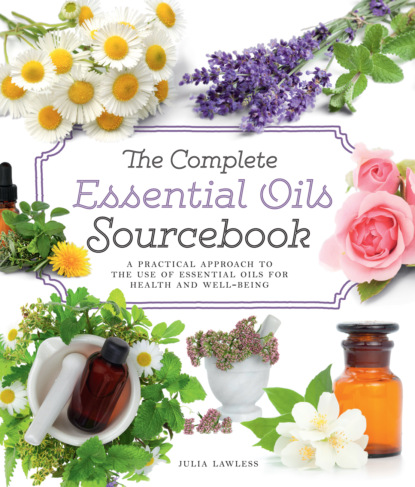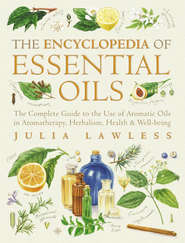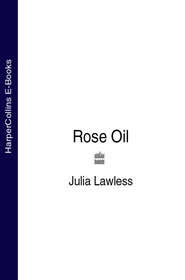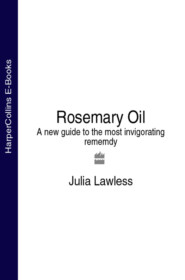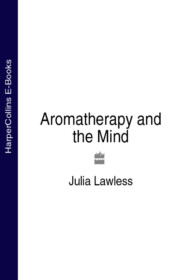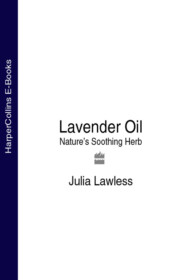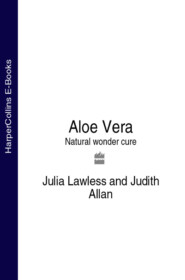По всем вопросам обращайтесь на: info@litportal.ru
(©) 2003-2024.
✖
The Complete Essential Oils Sourcebook: A Practical Approach to the Use of Essential Oils for Health and Well-Being
Настройки чтения
Размер шрифта
Высота строк
Поля
LAVENDER
Massage oil into the scalp to nourish the scalp. Lavender oil is good for dandruff.
Body powders
Aromatic body powders can be made by mixing about 4 tbsp/30g unperfumed talc or cornstarch with 5 to 6 drops essential oils. Seal the mixture in a closed container and let the base absorb the oils for at least 24 hours before use.
Hair tonic
Aromatic hair tonics are especially recommended for oily or thinning hair, because they can help to balance sebum levels (the oil produced at the base of the hair) and promote hair growth. Dissolve about 10 drops of essential oils suited to your hair type in one tablespoon of cider vinegar and add to 3½fl oz/100ml of lavender water. Shake well and massage into the scalp.
Quick scalp rub
A quick method to use for treating the scalp between washes, if required, is to rub about 10 drops of pure tea tree or lavender oil into the scalp using the fingertips. This is beneficial for the treatment of dandruff and as a general conditioner.
Dry shampoo
It is not beneficial to wash the hair too often, as this can strip the hair of its protective acid mantle. When short of time, or between shampoos, simply add a drop of rosemary essential oil, or an oil chosen for its fragrance, to one tablespoon of orris root powder or fuller’s earth. Part the hair in sections and sprinkle the mixture on. Leave for five minutes, then brush out thoroughly.
Aromatic shampoo
Buy a neutral pH shampoo (this is marked on the label) and add your own choice of essential oils to it. Add one or two drops of essential oil to a capful of shampoo at each wash, or add 30 to 50 drops of your chosen essential oil (or a blend) to a 3½fl oz/100ml bottle of shampoo, and shake well before using.
Aromatic rinse
Add a few drops of a suitable aromatherapy oil, such as chamomile, lavender, or rosemary, to the final rinse water together with one tablespoon of cider vinegar. This very effective, yet simple, procedure gives the hair a wonderful shine and maintains the acid mantle of the scalp. It also imparts a delicious fragrance and new vitality to the hair.
Powdered orris root can be used as the basis of an effective dry shampoo.
Fuller’s earth is used for scalp treatment.
WARNING
Some oils, including ylang ylang, cedarwood, cypress, lemon, lime, juniper, mandarin, and pine, are not stable in shampoo or detergent and should therefore not be used.
Aromatherapy and perfumery (#ulink_d8462c27-7cb5-5acc-b2bc-3682898dbe5d)
The psychological effects of fragrance have long been recognized, while herbs have probably been used for their specific effects by so-called “primitive” peoples since the dawn of time. It is certain that in the past natural aromatic substances were often employed successfully for their hallucinogenic, sedative, stimulating, sexually arousing, or anesthetizing effects on the mind, but a proper study of the action of scents, and specifically of essential oils, on the mind and behaviour has never been completed.
Psycho-aromatherapy
Psycho-aromatherapy, which focuses primarily on the psychological potential of essential oils, consists of two separate but interrelated fields—aromatic medicine and perfumery. In psycho-aromatherapy, the physiological effect of specific essential oils on the systems of the body is combined with the individual’s emotional or psychological reaction to their fragrance—with both aspects working together in a psychosomatic unity. It could be said that there are three different dimensions involved:
the physiochemical dimension: the chemical structure of the odor, its quality and concentration or intensity
the physiological dimension: the primary and secondary biological processes that are initiated upon contact with the oil
the psychological dimension: the subjective individual response to an odor—how the individual describes and is affected by it.
“He saw that there was no mood of the mind that had not its counterpart in the sensuous life …”
OSCAR WILDE
Responses to scents vary, but the rose has a perfume that is universally appreciated.
Some fragrances are generally experienced as pleasing, while others are widely perceived as repugnant, yet it is difficult to make hard and fast rules about how any individual will react to a particular smell. This is because the physiological effect of a given odor can be overridden by an individual’s specific emotional associations and psychological preferences. Sometimes even an unpleasant smell can have beneficial results if the associations are positive.
The close connection between the sense of smell and the experience of emotion has often been noted. It is suggested that, physiologically, molecules of odor in some way stimulate the same brain centers that signal the drives toward or away, which underlie almost all human emotion.
Our sense of smell influences our moods, emotions, and memories. In view of the idiosyncratic quality of smell, it is virtually impossible accurately to assess in advance an individual’s reaction to a particular odor, or to prescribe a fragrance for therapeutic purposes without taking all the following considerations into account:
Strong odors such as frankincense are thought to affect mood and emotion through a physiological effect on the brain.
CARDAMOM
LEMON
biological: the effect the odor is likely to have physiologically on the systems of the body—whether it is stimulating or sedating
archetypal associations: any universal associations the odor may have—the scent of the rose, for example, suggests femininity, love, divinity, and sweetness in all cultures
cultural connotations: certain scents take on a specific meaning according to the environmental, social, and cultural factors involved—the odor of frankincense, for example, will be especially significant in a culture that is Roman Catholic
individual responses: personal associations and preferences due to first-hand experience, which may be either positive or negative.
Since our response to scent is so individualistic, to what extent is it possible to use odors to bring about a predictable response? The writer Michael Stoddard asserts that although there is no odor capable of systematically inducing a given reaction in human beings, it is nevertheless possible that we are still subconsciously manipulated by odors. Since the sexual and social instincts of human beings are no longer controlled by scent-signals as they are in other mammals, odors do not bring about overt changes in human sexual or emotional behavior; rather, they create changes in mood or feeling states, often at a subliminal level. Such changed states, as studies have shown, can subtly color and redirect our thoughts, often without our noticing.
Masked Venetian ladies buying perfume in “The Perfume Seller” by Pietro Longhi, 1702–1785.
Scents largely influence us unwittingly. This is what endows them with such great psychological potential, for better or for worse. At present, there is a great deal of scientific interest in the potential psychological effects of aromas, and the Fragrance Research Foundation in New York has in recent years coined the term “aromachology” to describe the study and use of natural or synthetic odors in this field. The current commercial trend is also moving toward a rapid increase in the utilization of fragrance as a marketing agent. For example, in a trial test using fragranced shoes, it was shown that customers were attracted to the scented items in preference to nonscented items—even if they did not know why.
For exactly the same reasons that scent can sell shoes, fragrance can also be used as a very powerful therapeutic tool, especially for psychological or psychosomatic complaints. Fragrance has been found to be an ideal candidate for use in relaxation work, because it directly targets the inner mind, and bypasses any critical interference by the verbal, conscious mind. The word “osmotherapy” has been suggested specifically to describe the utilization of scents, both natural and artificial, for therapeutic purposes.
This approach, however, is quite distinct from psycho-aromatherapy, in that the latter employs only natural fragrances derived from botanical sources, and also combines inhalation with other methods of treatment. In aromatherapy, therapeutic massage forms a large part of the individual’s treatment. Aromatherapy massage is particularly beneficial because it combines inhalation with the healing effects of touch. Aromatic bathing also harmonizes scent with relaxation, as well as promoting absorption of the essential oils through the skin.
Thus, the practice of psycho-aromatherapy, while concentrating on the power of smell, actually embraces a variety of methods and techniques. In this respect it is a truly psychosomatic type of treatment for it operates on the body, mind, and emotions.
GERANIUM
LAVENDER
Scent and stress
The sense of smell is intimately connected with, and influences the functioning of, the central nervous system. Moreover, many illnesses could be said to be rooted in the mind—in a person’s negative outlook or underlying fears. It is well known that mental states such as anxiety, irritation, or anger cause physical changes in the body, including an increase in heart rate, and change in breathing pattern and muscle tone. Stress and mental unrest, which are thought to be at the root of so much of our 20th-century “disease,” eventually produce a degenerative effect on the entire organism.
There is also a reciprocal relationship between stress and scent, in that certain smells, especially those with pheromonal potential (the potential to influence others of their species), can cause stress reactions and vice versa. Animals are particularly sensitive to this phenomenon, but the smell of fear or the smell of disease can sometimes be picked up by humans with a trained nose. Happiness and good health have their characteristic scents, too.
A person’s subconscious attitudes are related to the limbic system, the most primitive part of the brain concerned with basic emotions and mood. Since the body and mind are intrinsically related, a change in the mental or psychological disposition of an individual can have dramatic results on the person’s physical health. And, since the limbic system is especially susceptible to the effects of fragrance, it is possible to heighten or influence a person’s underlying dispositions and attitudes by subjecting him or her to certain scents.
Другие электронные книги автора Julia Lawless
Rose Oil




 0
0





